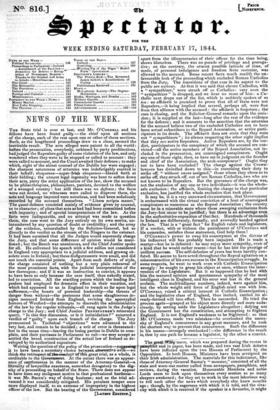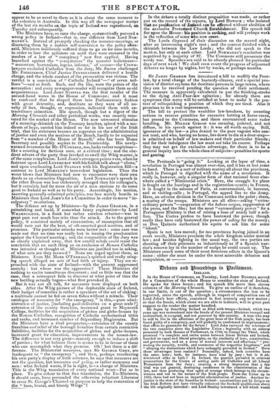The greal*Thig move, which was prepared during the recess in
pamphlet and in paper, has been made, and two vast Irish debates have been inflicted upon the two Houses of Parliament by the Opposition. In both Houses, Ministers have been arraigned on their Irish administration. The materials for this indictment, like those of Attorney-General Sairrn's "monster," consisted of all the stale and worn-out matter culled from newspapers, pamphlets, and reviews, during the vacation. Honourable Members and noble Lords seem to look upon themselves every session as so many sleepers awakened ; for they set to work in the most laborious way to tell each other the news which everybody else knew months ago ; though, by the eagerness with which it is told, and the viva- city with which it is received if the speaker is a favourite, it might appear to be as novel to them as it is about the same moment to the colonists in Australia. In this way all the newspaper mattpr of the last six months oa the topic of Ireland was reproduced, Au Tuesday and subsequently: The Ministers have, so runs the charge, systematically pursued a wrong policy in Ireland—that is, one different from Lord Non-
steNny's. Instead of promptly checking the monster-meetings, or disarming them by a sudden self-conversion to the policy afore- !aid, Ministers insidiously suffered thew to go on for nine months,
in order to lure the agitators on until they were ensnared in the
meshes of a law of " conspiracy" now first applied. Having launched against the " conspirators" the monster indictment- " monstrum horrendum, ingens, informe," of course—the Crown-
lawyers excluded Catholics from the Jury, Mr. SMITH challenged Mr. FITZGIBBON, Chief Justice PENNEEATHEIC delivered a hostile
charge, and the whole conduct of the prosecution was vicious. The verdict is a conviction of " Catholic Ireland"—" of seven mil- lions "—and so forth. Such, and the like, were the points of the accusation : and every newspaper-reader will recognize them as old acquaintances. Lord JOHN RUSSELL was the first retailer of the second-band wares in the House of Commons; and it must
be confessed that he shaped them into Parliamentary fashion 'with great dexterity, and, destitute as they were of all no- velty of fact, thought, or expression, delivered them with ex- traordinary animation. His speech, though but a digest of the Morning Chronicle and other periodical works, was smartly reno- vated for the market of the House. The now unwonted stimulus of a storming-skirmish on the Treasury benches, spiced with a mo-
dicum of hope, carried him indeed so far in his use of the Irish trial, that his strictures became an aspersion on the administration of justice and even the motives of the Bench, hardly to be expected from "a member of the House of Russell," who has been Home Secretary and possibly aspires to the Premiership. His newly- warmed reverence for Mr. O'CONNELL, too, looks rather suspicious— like a courting for factious uses, at a critical time ; and the obe- dient advent of the party thus invoked to swell the Whig muster, is of the same complexion. Lord JOHN'S strongest points were, when be fastened upon Lord LYNDHURST with his foolish talk about" aliens," and upon overbearing Lord STANLEY with his Registration Bill—a contrast to Lord MORPETLI'S benevolent legislation. Thus the worst blows that Ministers had now to encounter were their own deeds as an obstructive Opposition. Lord NORMANBY'S speech in the other House was less elaborately arranged than his colleague's, but it certainly had far more the air of a man anxious to do some good to Ireland as well as to his party. Accordingly, his motion, asserting generally-admitted principles, was less merely hostile to Ministers than Lord Jorns's for a Committee in order to move "in- culpatory" resolutions. The defence set up by Ministers—by Sir JAMES GRAHAM, in a painafaking and lucid, if somewhat heavy explanation—by Lord VVILARNCLIFEE, in a frank but rather careless rebutter—was in great part not much less trite than the attack. As to the general policy, it consisted mainly of extenuation, of assumption that all would turn out for the best, of oft-asserted good motives, and of promises. The particular attacks were better met : some case was made out that no time was really lost in issuing the proclamation against the Cloutarf meeting ; and the composition of the Jury was so clearly explained away, that few candid minds could resist the Conviction that no such thing as an exclusion of Rowan Catholics
was intended or thought of. Ministers are justified too in asking,
of what acts are they accused ? None are urged against them, as Ministers. Even Mr. MORE O'FErtaeLL's spirited and really sting- ing speech alleged no acts of bad faith or injury. They are re- proached with the state of Ireland—with the present suppressed anarchy : but whose was the aggression ? These Ministers did
nothing to excite tumultuous discontent ; and so little was that the case, that a retrospect fails to discover at what point of time the new battling actually began—what first provoked rt.
But it was not all talk, for measures were displayed OD both sides. After the Whig picture of the deplorable state of Ireland, their budget of remedies is rather a specimen of the art of sinking :
a multitude cannot be fed on seven fishes without a miracle. Their catalogue of measures for " the emergency " is this,—pure admi-
nistration of justice, [including gaol-deliveries on a great scale ?] extension of the county franchise, increased grant to Maynooth College, facilities for the acquisition of glebes and glebe-houses by the Roman Catholics, recognition of Catholic ecclesiastical titles
and ranks, and increased number of Stipendiary Magistrates. But the Ministers have a rival prospectus,—extension of the county
franchise and relief of the borough franchise from certain restrictive liabilities, facilities for the acquisition of glebes and glebe-houses, increased grant for education, improvements in the tenant-law.
The difference is not very great—scarcely enough to induce a shift of parties ; for what balance there is seems to be in favour of those who can accomplish what they promise. Oh but there is a dif- ference. The Ministerial measures, says Sir GEORGE GREY, are inadequate to " the emergency "; and then, perhaps recollecting his own party's display of little schemes, he says that measures are not the question, but measures and policy, or rather measures and men : what Ireland wants, if he is right, is—a change of Ministers. This is the Whig translation of every national want—Put us in
place. To give colour to that free translation, the Ex-Ministers, it should seem, have persuaded the otherwise reluctant Liberator to cross St. George's Channel on purpose to help the restoration of the "base, brutal, and bloody Whigs"! In the debate a totally distinct proposition was made, or rather put on the record of the reports, by Lord Howrac ; who insisted tiara no pacification of 4stfland can be effected without abolition of the exclusive ProterttaniChurcb Establishment. His speech fell flat upon the House : bla position is striking, and will perhaps work in the reflection of some who now sneer.
The Lords disposed of their discussion on the second night, after an intervening night's rest ; and the contest finished with a skirmish between the Law Lords; who did not speak to the Emden, but only at each other. Lord NonstrANny's resolution was negatived by a majority of 97. The Commons still prosecute the wordy war. Speeches are said to be already planned for particular days of next week ! We shall soon count the progress of adjourned debates no longer by nights, but by weeks, or perhaps months.
Sir JAMES GRAHAM has introduced a bill to mollify the Poor- law, by a total change of the bastardy-clauses, and a special pro- vision of district asylums for destitute persons in large towns, where they can be received pending the question of their settlement. The measure is apparently calculated to put the finishing-stroke to the dying Anti-Poor-law agitation ; for already there are symptoms that many will be satisfied at least to make it the pre- text of relinquishing a position of which they are tired. Also it promises to be a real improvement. The bill to protect the wealthier law-breakers, by arresting actions to recover penalties for excessive betting at horse-races, has passed to the Commons, and there encountered some ruder handling. Mr. MILNER GIBSON was amusing, pointed, and not diffuse, in his speech against it : it was all worth saying. Still, ignorance of the law—a plea denied to the poor vagrant who Can- not read, and who, having no home, lies down to die at a door-step- is admitted on behalf of law-makers and their particular friends ; and for their indulgence the law must not take its course. Perhaps they may not get the exclusive advantage, for there ie to be a general inquiry into the whole class of subjects—penalties for sports and gaming.



























 Previous page
Previous page